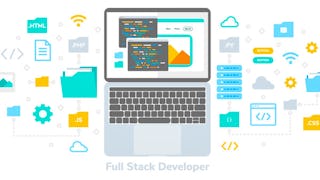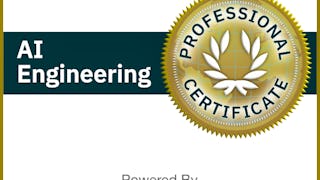Filter by
SubjectRequired
LanguageRequired
The language used throughout the course, in both instruction and assessments.
Learning ProductRequired
LevelRequired
DurationRequired
SkillsRequired
SubtitlesRequired
EducatorRequired
Explore the Optical Engineering Course Catalog
 Status: Free Trial
Status: Free TrialUniversity of Colorado Boulder
Skills you'll gain: Electrical Engineering, Equipment Design, Performance Tuning, Simulation and Simulation Software, Engineering Calculations, Design Software, Hardware Design, Engineering Analysis, Display Devices, Engineering, Scientific, and Technical Instruments, Computer-Aided Design, Engineering Design Process, Systems Design, Computer Displays, Numerical Analysis, Applied Mathematics, Human Factors, System Design and Implementation, Medical Imaging, Physics
 Status: Free TrialStatus: AI skills
Status: Free TrialStatus: AI skillsSkills you'll gain: Prompt Engineering, Istio, Software Development Life Cycle, Node.JS, HTML and CSS, Cloud Computing Architecture, Server Side, Application Deployment, React Redux, Kubernetes, Cloud Services, Software Architecture, Django (Web Framework), Development Environment, Git (Version Control System), Flask (Web Framework), Full-Stack Web Development, Cloud Computing, Jupyter, Interviewing Skills
 Status: NewStatus: Free Trial
Status: NewStatus: Free TrialUniversity of Colorado Boulder
Skills you'll gain: Electrical Power, Power Electronics, Electrical Systems, Torque (Physics), Electronic Components, Electric Power Systems, Electrical Equipment, Basic Electrical Systems, Semiconductors, Electrical Engineering, Mechanical Engineering, Control Systems, Electronics, Engineering Calculations, Low Voltage, High Voltage, Energy and Utilities, Machine Controls, Electronics Engineering, Structural Analysis
 Status: Free Trial
Status: Free TrialVanderbilt University
Skills you'll gain: Prompt Engineering, ChatGPT, Productivity, Generative AI, Artificial Intelligence, Large Language Modeling, Creative Thinking, Ingenuity, Brainstorming, Problem Solving, Application Development, Collaboration
 Status: Free Trial
Status: Free TrialThe Hong Kong University of Science and Technology
Skills you'll gain: Differential Equations, Linear Algebra, Matlab, Engineering Calculations, Engineering Analysis, Numerical Analysis, Finite Element Methods, Integral Calculus, Mechanical Engineering, Calculus, Algebra, Applied Mathematics, Mathematical Modeling, Engineering, Advanced Mathematics, Geometry, Simulation and Simulation Software, Scripting, General Mathematics, Simulations
 Status: Free Trial
Status: Free TrialSkills you'll gain: Prompt Engineering, Large Language Modeling, PyTorch (Machine Learning Library), Unsupervised Learning, Keras (Neural Network Library), Supervised Learning, Feature Engineering, Generative AI, Reinforcement Learning, Deep Learning, Natural Language Processing, Generative AI Agents, Applied Machine Learning, Image Analysis, Data Manipulation, Tensorflow, OpenAI, Verification And Validation, Artificial Intelligence and Machine Learning (AI/ML), Scikit Learn (Machine Learning Library)
 Status: Free Trial
Status: Free TrialSkills you'll gain: Prompt Engineering, ChatGPT, Generative AI, Large Language Modeling, Image Analysis
 Status: Free Trial
Status: Free TrialUniversity of Michigan
Skills you'll gain: Machine Learning Methods, Artificial Intelligence and Machine Learning (AI/ML), Precision Medicine, Generative AI, Machine Learning, Artificial Intelligence, Machine Learning Algorithms, Energy and Utilities, Image Analysis, Computer-Aided Design, Design Thinking, Technical Design, Deep Learning, Computer Vision, Medical Imaging, Statistical Machine Learning, Reinforcement Learning, Electric Power Systems, Bioinformatics, Artificial Neural Networks
 Status: Free TrialStatus: AI skills
Status: Free TrialStatus: AI skillsSkills you'll gain: NoSQL, Data Warehousing, SQL, Apache Hadoop, Extract, Transform, Load, Apache Airflow, Web Scraping, Linux Commands, Database Design, IBM Cognos Analytics, MySQL, Apache Spark, Data Pipelines, Apache Kafka, Database Management, Bash (Scripting Language), Data Store, Jupyter, Generative AI, Professional Networking
 Status: Free Trial
Status: Free TrialSkills you'll gain: Software Development Life Cycle, Software Architecture, Development Environment, Engineering Software, Software Design, Software Development Tools, Software Engineering, Program Development, Systems Development, Software Documentation, Software Design Patterns, Software Development Methodologies, Unified Modeling Language, Integrated Development Environments, Programming Principles, Application Development, Agile Methodology, Python Programming
 Status: Free Trial
Status: Free TrialSkills you'll gain: Prompt Engineering, Software Development Life Cycle, HTML and CSS, Large Language Modeling, Software Architecture, Development Environment, Flask (Web Framework), Generative AI, Unit Testing, ChatGPT, Jupyter, Artificial Intelligence, Bootstrap (Front-End Framework), Software Design, Software Development Tools, OpenAI, Front-End Web Development, Python Programming, Interviewing Skills, Engineering Software
 Status: Free Trial
Status: Free TrialSkills you'll gain: Jest (JavaScript Testing Framework), Version Control, UI/UX Research, Usability Testing, Responsive Web Design, Data Structures, Unix Commands, HTML and CSS, Git (Version Control System), Persona (User Experience), GitHub, Interaction Design, User Experience Design, User Interface and User Experience (UI/UX) Design, Bootstrap (Front-End Framework), React.js, Mobile Development, Front-End Web Development, Algorithms, Javascript
Optical Engineering learners also search
In summary, here are 10 of our most popular optical engineering courses
- Optical Engineering: University of Colorado Boulder
- IBM Full Stack Software Developer: IBM
- Sensors for a Carbon Free World: University of Colorado Boulder
- Prompt Engineering for ChatGPT: Vanderbilt University
- Mathematics for Engineers: The Hong Kong University of Science and Technology
- IBM AI Engineering: IBM
- Generative AI: Prompt Engineering Basics: IBM
- AI for Mechanical Engineers: University of Michigan
- IBM Data Engineering: IBM
- Introduction to Software Engineering: IBM










